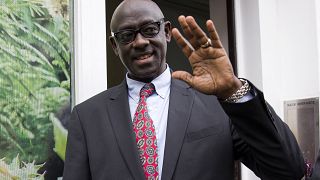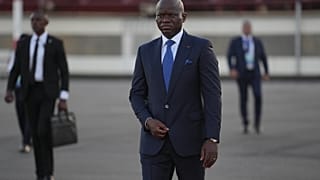United Kingdom
A British court ruled Thursday that a U.K. government plan to send asylum-seekers on a one-way trip to Rwanda is unlawful, delivering a blow to the Conservative administration's pledge to stop migrants making risky journeys across the English Channel.
Refugee law expert David Cantor said the ruling would “send a ripple effect more widely through this idea of sending asylum seekers to third countries.”
“Any country that might wish to enter into this kind of memorandum with the U.K. government, as Rwanda did, would equally be quite likely to be a government which had weak asylum procedures, (where) there were questions about safety in the country,” said Cantor, director of the Refugee Law Initiative at the University of London’s School of Advanced Study.
He said the U.K. "has had negotiations with many countries which do have robust court structures and asylum procedures, and there’s very little willingness there to contemplate these sorts of schemes.”
In a split two-to-one ruling, three Court of Appeal judges said Rwanda could not be considered a “safe third country” where migrants from any country could be sent.
But the judges said that a policy of deporting asylum seekers to another country deemed as safe was not in itself illegal, and the government said it would challenge the ruling at the U.K. Supreme Court.
It has until July 6 to lodge an appeal.
Even if the plan is ultimately ruled legal, it's unclear how many people could be sent to Rwanda.
The government's own assessment acknowledges it would be extremely expensive, coming in at an estimated 169,000 pounds ($214,000) per person.
But it is doubling down on the idea, drafting legislation barring anyone who arrives in the U.K. in small boats or by other unauthorized means from applying for asylum.
If passed, the bill would compel the government to detain all such arrivals and deport them to their homeland or a safe third country.
The U.K.'s Home Secretary on Thursday slammed a decision by a top judge to rule the government's plans to send asylum seekers to Rwanda "unlawful".
Speaking in London, Suella Braverman said she was "disappointed" with the decision by the Court of Appeal, and said she and the Prime Minister Rishi Sunak disagreed with the judgement.
The government made the deal with Rwanda more than a year ago that some migrants who arrive in the U.K. as stowaways or on small boats would be sent on a one-way trip to Rwanda where their asylum claims would be processed - if the claims were successful they would stay in the East African nation rather than returning to Britain.
The scheme is a major part of the government's pledge to "stop the boats" - it is hoping that the plan will deter people from attempting to cross the channel and in turn stop the criminal gangs who charge large sums to ferry people across the waters.
Braverman said the problem was "out of control", arguing that 45,000 people had "arrived here illegally last year" to a cost of "£6 million ($7.5 million) a day in hotel accommodation" to the British taxpayer.
"We need to change the system. We need to change our laws. That's how we're going to stop the boats," she said.
Speaking in Selby, the leader of the opposition Labour party Keir Starmer said the government had "broken the system" and called the Rwanda scheme "a gimmick".
"Only 1% of those arrived by small boats have had their claims processed and so the Government got no plan", he said, adding that the scheme had "cost the taxpayer £140 million ($176 million) and nobody's been removed".
"Now we know from the court judgement this morning that the Government didn't even do the basics to make sure that it was fit for purpose," he added.
The government is likely to challenge the ruling at the U.K. Supreme Court.











02:19
In Goma, Kivu Fashion Week celebrates solidarity, hope and resilience
00:32
Greece rescues 545 migrants off Crete after distress call
00:54
Spanish police evict hundreds of mostly illegal migrants living in a squat
01:30
M23 rebels take control of strategic Congo town as peace deal crumbles
01:14
UK sanctions four senior RSF commanders over atrocities in Sudan
00:58
M23 rebels claim control of Uvira in eastern Congo